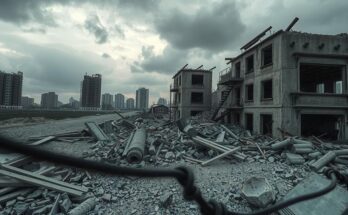President Trump has escalated tensions by stating that future Houthi attacks will be deemed Iranian aggression, warranting severe repercussions for Tehran. This follows recent U.S. military strikes against the Houthis in response to their attacks on U.S. forces and maritime traffic. Iranian officials deny involvement, issuing threats of retaliation, emphasizing the ongoing conflict’s complexity and potential for escalation.
On Monday, President Donald Trump heightened his rhetoric regarding Iran, indicating that any forthcoming assaults by the Houthi militant group in Yemen will be regarded as direct attacks orchestrated by Tehran. He asserted that Iran would be deemed accountable and face severe repercussions. These comments came in light of U.S. military actions targeting Houthi positions following their attacks on maritime traffic and U.S. personnel.
In a post on Truth Social, Trump emphasized that the following Houthis’ attacks would be recognized as strikes from Iran, emphasizing that Houthis are manipulated and resourced by Tehran. He stated, “Let nobody be fooled! The hundreds of attacks being made by Houthi… all emanate from, and are created by, IRAN.” He warned, “Any further attack or retaliation by the ‘Houthis’ will be met with great force…”
Trump accused Iran of actively controlling the Houthis’ military strategies, claiming they provide essential resources such as weapons and funding. He declared that, henceforth, every Houthi attack would be perceived as a direct aggression from Iran. He warned that Iran would face dire consequences for its involvement.
Iran has consistently refuted claims of direct participation in the recent Red Sea attacks. Following U.S. airstrikes against the Houthis, Iranian leaders threatened retaliation. General Hossein Salami of Iran’s Islamic Revolutionary Guard Corps stated that any aggression towards Iran would provoke a strong and devastating response. A spokesperson from Iran’s foreign ministry reiterated this warning, emphasizing the nation’s resolve to protect its territorial integrity.
The Houthis, a Shiite Islamic militant group, have maintained control over parts of Yemen amidst ongoing Saudi-led military efforts. Over the last 18 months, they have conducted multiple direct assaults on U.S. naval forces and commercial vessels, raising concerns regarding international shipping lanes. Secretary of State Marco Rubio has underscored the threat these attacks pose to global commerce, affirming a U.S. commitment to respond with force until they cease.
The Houthis claim their actions are retaliatory against Israel’s military activity in Gaza, which aligns with Iranian interests. The U.S. recently redesignated the Houthis as a foreign terrorist organization, reversing a prior decision made during the Biden administration, which Trump argued emboldened the group. National security adviser Michael Waltz confirmed the success of U.S. military operations against key Houthi figures, albeit without disclosing specific details. Despite these developments, the Houthis announced they would respond to escalation with escalation.
President Trump’s latest assertions mark a significant shift in how the U.S. perceives Houthi actions and Iranian involvement in the Middle East. With a strong declaration that future Houthi attacks will be regarded as Iranian aggression, tensions in the region are poised to escalate. Echoing Trump’s sentiments, statements from both U.S. officials and Iranian leaders suggest a potential for heightened conflict unless a diplomatic resolution is pursued. Overall, the narrative surrounding the Houthis and their relationship with Iran necessitates careful attention amidst ongoing military engagements.
Original Source: signalscv.com




